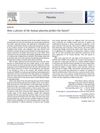 1 citations,
January 2017 in “Przegla̧d dermatologiczny”
1 citations,
January 2017 in “Przegla̧d dermatologiczny” People with more than 11 skin tags, especially on the thigh, neck, or armpit, may have a higher chance of metabolic syndrome.
[object Object]  July 2015 in “Cambridge University Press eBooks”
July 2015 in “Cambridge University Press eBooks” The document concludes that careful history and physical exams are crucial for accurately diagnosing polycystic ovary syndrome and distinguishing it from other similar conditions.
 5 citations,
March 2015 in “Women's Health”
5 citations,
March 2015 in “Women's Health” The document concludes that diagnosing PCOS requires a thorough approach, considering various symptoms and risks, and calls for improved methods to identify PCOS types and prevent diabetes.
 24 citations,
January 2015 in “International Journal of Trichology”
24 citations,
January 2015 in “International Journal of Trichology” Early balding in young Indian men may indicate a higher risk of metabolic syndrome and potential heart disease.
 40 citations,
November 2011 in “American Journal of Human Biology”
40 citations,
November 2011 in “American Journal of Human Biology” Stress from being transgender is linked to higher blood pressure at night and more inflammation, which may affect heart health.
 May 2021 in “Zbalansovane prirodokoristuvannâ”
May 2021 in “Zbalansovane prirodokoristuvannâ” Some shampoos have harmful ingredients that can cause health problems, but these are needed for the shampoos to work properly.
 October 2016 in “Journal of the Dermatology Nurses’ Association”
October 2016 in “Journal of the Dermatology Nurses’ Association” Polycystic Ovary Syndrome (PCOS) affects 6%-15% of women of reproductive age, causing symptoms like acne and hair loss, and increasing the risk of type 2 diabetes and heart disease; it's managed through diet, exercise, and medications like Metformin and hormonal contraceptives.
 1 citations,
July 2022 in “International journal of homoeopathic sciences”
1 citations,
July 2022 in “International journal of homoeopathic sciences” Homoeopathic treatment may help manage polycystic ovarian syndrome.
 21 citations,
August 2014 in “Gynecological Endocrinology”
21 citations,
August 2014 in “Gynecological Endocrinology” Higher hs-CRP levels in Indian adolescent women with PCOS are more related to BMI than PCOS itself.
 4 citations,
February 2011 in “Nature Reviews Endocrinology”
4 citations,
February 2011 in “Nature Reviews Endocrinology” Metformin and thiazolidinediones are similarly effective for PCOS, but metformin is often preferred due to fewer side effects.
 14 citations,
March 2014 in “Journal of The European Academy of Dermatology and Venereology”
14 citations,
March 2014 in “Journal of The European Academy of Dermatology and Venereology” Young adults with hair loss face higher risk of stiff arteries.
 6 citations,
April 2019 in “Endocrinology and Metabolism Clinics of North America”
6 citations,
April 2019 in “Endocrinology and Metabolism Clinics of North America” Testosterone therapy for transmasculine individuals is generally safe with medical supervision, improves mental health, and has mixed effects on physical health.
 114 citations,
January 2014 in “World Journal of Gastroenterology”
114 citations,
January 2014 in “World Journal of Gastroenterology” People with PCOS, especially if obese, often have NAFLD, linked to obesity, insulin resistance, and high androgen levels.
 29 citations,
February 2016 in “International Journal of Dermatology”
29 citations,
February 2016 in “International Journal of Dermatology” People with lichen planus are more likely to have dyslipidemia, especially higher triglyceride levels.
 August 2016 in “CRC Press eBooks”
August 2016 in “CRC Press eBooks” Before treating hair loss, it's crucial to diagnose and treat any underlying medical conditions that may be causing it.
 2 citations,
January 2013 in “Hair therapy & transplantation”
2 citations,
January 2013 in “Hair therapy & transplantation” Hair loss may signal metabolic problems and increased risk of heart disease, suggesting people with hair loss should be checked for these issues.

The document concludes that accurate diagnosis and management of PCOS are crucial due to its associated health risks.
 28 citations,
October 2018 in “Clinical Obstetrics and Gynecology”
28 citations,
October 2018 in “Clinical Obstetrics and Gynecology” Testosterone therapy seems safe and effective for transgender men with proper care, but more long-term research is needed.
 October 2018 in “Journal of Clinical Research in Pediatric Endocrinology”
October 2018 in “Journal of Clinical Research in Pediatric Endocrinology” Children with classic congenital adrenal hyperplasia have thicker heart fat and more heart and blood vessel risk factors, especially if their condition is not well-controlled.
 150 citations,
October 2012 in “Clinical Endocrinology”
150 citations,
October 2012 in “Clinical Endocrinology” Women with PCOS have a higher risk of diabetes and heart problems, especially when they get older.
 9 citations,
May 2015 in “Cardiology Clinics”
9 citations,
May 2015 in “Cardiology Clinics” The conclusion is that managing cholesterol is important for women, especially during pregnancy, breastfeeding, and with PCOS, and involves regular screening and careful treatment choices.
 August 2008 in “Obstetrics & gynecology science”
August 2008 in “Obstetrics & gynecology science” Polycystic Ovary Syndrome (PCOS) is a complex disorder with both immediate and long-term health effects, including menstrual issues, infertility, and increased risk of diabetes and heart disease.
[object Object]  11 citations,
September 2012 in “Journal of obstetrics and gynaecology Canada”
11 citations,
September 2012 in “Journal of obstetrics and gynaecology Canada” Testosterone therapy seems safe for short-term use in postmenopausal women with low sexual desire, but more research on long-term effects is needed.
Women with acne may have a higher chance of having PCOS, which can lead to other health problems.
 17 citations,
June 2012 in “The Anatolian journal of cardiology”
17 citations,
June 2012 in “The Anatolian journal of cardiology” Premature hair graying may be a sign of increased risk for heart disease, indicating biological age is more important than actual age.
 January 2013 in “Yearbook of Urology”
January 2013 in “Yearbook of Urology” The Princeton III Consensus recommends assessing cardiovascular risk in men with erectile dysfunction and prioritizing heart health before treating ED, especially in those with potential heart disease.
 4 citations,
May 2011 in “PubMed”
4 citations,
May 2011 in “PubMed” Alopecia should be treated as a medical condition because it may increase the risk of serious diseases and psychological issues.
 3 citations,
October 2010 in “Placenta”
3 citations,
October 2010 in “Placenta” The shape and size of the placenta may help predict future health risks for both mother and child.
 212 citations,
May 2010 in “American Journal of Obstetrics and Gynecology”
212 citations,
May 2010 in “American Journal of Obstetrics and Gynecology” Diagnosing PCOS in teenagers is challenging and should use strict criteria to avoid misdiagnosis and unnecessary worry.
 37 citations,
January 2010 in “Acta dermato-venereologica”
37 citations,
January 2010 in “Acta dermato-venereologica” People with early onset baldness have higher bad cholesterol and lower good cholesterol, increasing their heart disease risk.





























